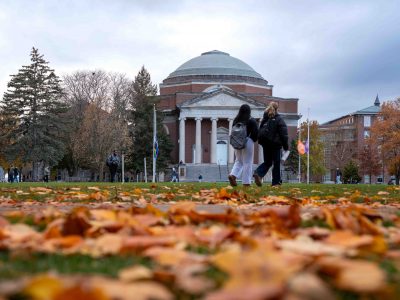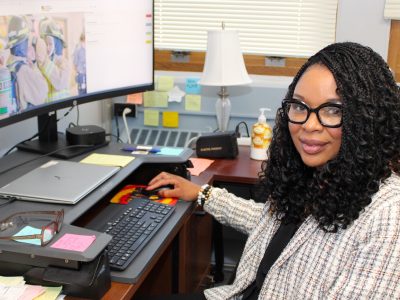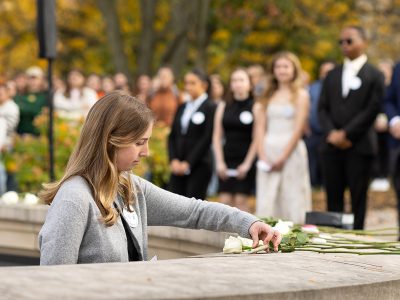Annual Three-Minute Thesis Competition Provides Research Capsule Talks
Creating an elevator pitch from information gleaned through years of specialized research takes clear thinking, precise wording and a flair for presenting to an audience. Just ask the participants of this year’s Three-Minute Thesis (3MT) competition. Ten graduate and doctoral students took part in the contest’s final round last month.
3MT provides participants with the chance to share details about their research and creative work in a compelling way—within a three-minute time limit. It was first developed by the University of Queensland in Australia and is now held at colleges and universities around the world.
“3MT forces students to come up with ways to describe their research succinctly to non-specialists in a way that is not just comprehensible, but is also interesting and engaging. That’s a skill set that will pay off on the job market, and even beyond, as far as interacting with the media and others who can help disseminate your work and findings more broadly,” says Glenn Wright, executive director of career and professional development for the Graduate School, who runs the competition.
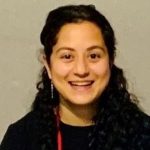
This year’s top winner is Nimisha Thakur, a Ph.D. student in anthropology, whose topic was “River Song: Riverine Futures Amidst Climate Change on the Brahmaputra Floodplains.” Thakur, a graduate research associate at the South Asia Center in the Maxwell School of Citizenship and Public Affairs, won a 16-inch MacBook Pro M3 and a year membership in the Anthropological Association of America. Thakur also has the chance to represent Syracuse University in the regional 3MT competition hosted by the Northeastern Association of Graduate Schools.
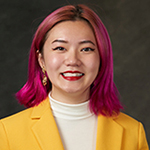
Qingyang Liu, a Ph.D. student in human development and family science, was named the “People’s Choice” winner by audience vote. Liu conducts research in the SELF Regulation Laboratory in the David B. Falk College of Sport and Human Dynamics. Her topic was “Material Hardship’s Influence on Self-Regulation Across Childhood: Which Hardship Truly Matters?” The prize was a set of Bose noise-cancelling headphones.
Additional finalists were:
- Caroline Barraco, master’s student in history, “Authenticity, Commodity and Empire in the Early Modern Spanish Relic Trade”
- Yener Çağla Çimendereli, Ph.D. student in philosophy, “Nonnative Speaking and Linguistic Justice”
- Nicholas Croce, Ph.D. student in social science, “America’s Forgotten Labor Colony Experiment”
- Nardini Jhawar, Ph.D. student in clinical psychology, “Racial Reflections: Examining ADHD Help-Seeking Among Asian American College Students”
- Matthew D. O’Leary, Ph.D. student in anthropology, “Entangled Frontiers: Capitalism and Artifacts of Power at Fort St. Frédéric”
- Andrew Ridgeway, Ph.D. student in composition and cultural rhetoric, “Evil We Desire: Akrasia and Conspiracy Rhetoric”
- Paul Sagoe, Ph.D. student in biomedical engineering, “From Joint Pain to Joy Gain: Delivering Drugs for Osteoarthritis Cure”’
- Julia Zeh, Ph.D. student in biology, “From Baby Babbles to Masterful Melodies: Investigating Vocal Development in Humpback Whales”
Judges were Sarah Hamersma, associate professor and director of doctoral studies in public administration and international affairs, and Chung-Chin Eugene Liu, assistant professor of economics, both of the Maxwell School; and Corey Williams, a Syracuse City School District employee and a Common Councilor for Syracuse’s Third District.

